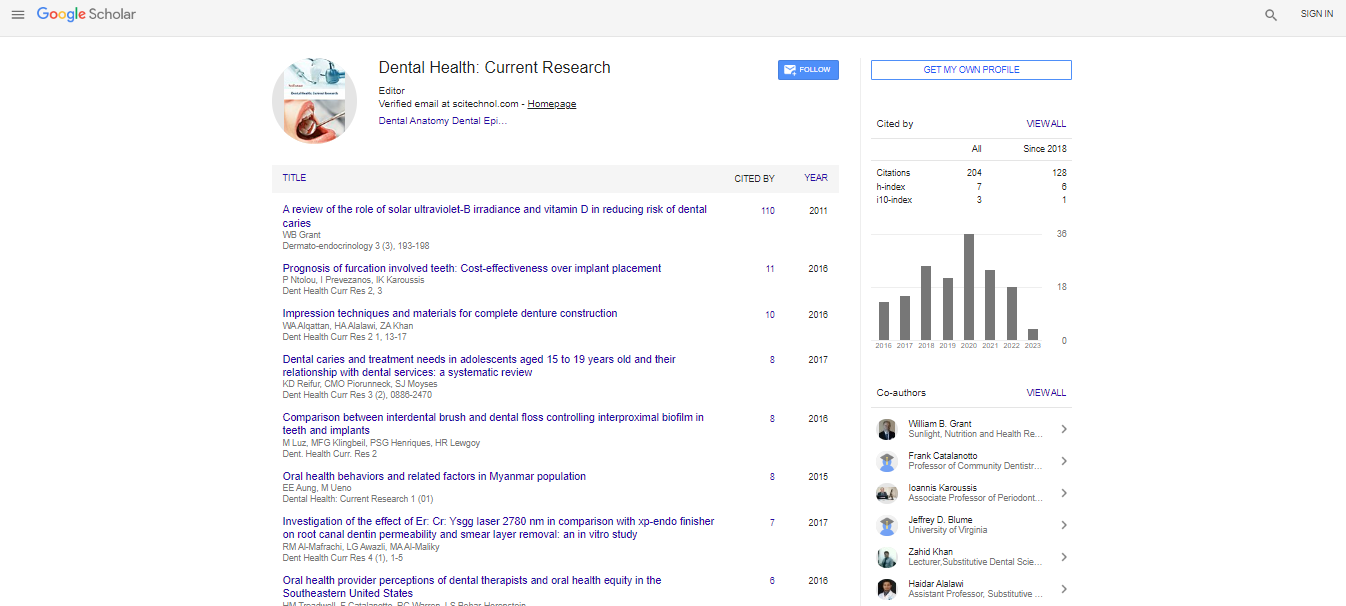Opinion Article, Dent Health Curr Res Vol: 10 Issue: 4
Combatting Tooth Sensitivity: Tips for Protecting Sensitive Teeth
George Doran*
1Department of Restorative Sciences, the Dental College of Georgia at Augusta University, Augusta, Georgia
*Corresponding Author: George Doran,
Department of Restorative Sciences, the
Dental College of Georgia at Augusta University, Augusta, Georgia
E-mail: gdoran@77889.edu
Received date: 22 July, 2024, Manuscript No. DHCR-24-147395;
Editor assigned date: 24 July, 2024, PreQC No. DHCR-24-147395 (PQ);
Reviewed date: 07 August, 2024, QC No. DHCR-24-147395;
Revised date: 14 August, 2024, Manuscript No. DHCR-24-147395 (R);
Published date: 21 August, 2024, DOI: 10.4172/2470-0886.1000228
Citation: Doran G (2024) Combatting Tooth Sensitivity: Tips for Protecting Sensitive Teeth. Dent Health Curr Res 10:4.
Abstract
Description
Tooth sensitivity is a common dental issue that causes discomfort or pain when teeth are exposed to hot, cold, sweet, or acidic foods and drinks. It can also occur during brushing or flossing. This sensitivity typically results from the gradual erosion of tooth enamel or the exposure of tooth roots. If left unaddressed, it can significantly affect daily activities and overall quality of life. Fortunately, there are effective strategies to manage and prevent tooth sensitivity, helping to protect your teeth and ensure long-term oral health.
The enamel is the protective outer layer of the tooth. Over time, it can wear away due to acid erosion from food, beverages, or conditions such as acid reflux. Once the enamel is damaged, the underlying dentin, which contains microscopic tubules leading to the nerves of the tooth, becomes exposed. This exposure allows external stimuli to reach the nerves, causing sensitivity. Gum recession occurs when the gums pull back from the teeth, exposing the roots, which are not protected by enamel. This can lead to sensitivity, particularly at the gum line. Gum recession is often caused by aggressive brushing, gum disease, or aging.
Chronic grinding or clenching of teeth can wear down enamel, leading to increased sensitivity. Teeth grinding often occurs unconsciously during sleep or in response to stress. Some individuals experience temporary tooth sensitivity after using teeth-whitening products. The bleaching agents in these products can temporarily weaken the enamel and expose the dentin. One of the simplest and most effective ways to manage tooth sensitivity is by using a toothpaste specifically designed for sensitive teeth. These desensitizing toothpastes contain compounds like potassium nitrate or stannous fluoride that help block the transmission of pain signals from the tooth surface to the nerves. Regular use can provide relief from sensitivity over time, though it may take a few weeks to notice a significant difference.
Dietary choices play a key role in managing tooth sensitivity. Acidic foods and beverages, such as citrus fruits, sodas and vinegarbased products, can erode enamel and exacerbate sensitivity. Limiting the consumption of these foods can help protect your teeth. If you do consume acidic foods, rinse your mouth with water afterward to neutralize the acids and wait at least 30 minutes before brushing your teeth to prevent further enamel damage.
Fluoride is a mineral that helps strengthen enamel and can reduce tooth sensitivity. Incorporate fluoride into your oral care routine by using fluoride toothpaste and mouthwash. Your dentist may also recommend professional fluoride treatments, especially if your enamel is weakened or if you are prone to cavities. These treatments help rebuild enamel and provide a protective barrier for sensitive teeth.
Proper oral hygiene is essential for preventing tooth sensitivity and maintaining overall oral health. Brush your teeth twice a day, floss daily and use a fluoride mouthwash to keep your teeth clean and healthy. Regular dental check-ups are also important as they allow your dentist to detect early signs of gum disease, cavities, or enamel erosion and provide treatment before the condition worsens. If you experience tooth sensitivity, it’s best to avoid or limit the use of overthe- counter whitening products. These products often contain bleaching agents that can increase sensitivity. If you want to whiten your teeth, consult your dentist for professional options that are less likely to cause discomfort.
Conclusion
Tooth sensitivity is a common issue that can significantly impact daily life, but it is manageable with the right approach. By understanding the causes of sensitivity and implementing strategies such as using desensitizing toothpaste, adopting gentle brushing habits and avoiding acidic foods, you can protect your teeth and reduce discomfort. Regular dental visits and maintaining a consistent oral hygiene routine are essential for preventing further damage and ensuring long-term oral health. If sensitivity persists or worsens, it is important to consult with a dentist to identify and address the underlying cause, ensuring your teeth stay healthy and pain-free.
 Spanish
Spanish  Chinese
Chinese  Russian
Russian  German
German  French
French  Japanese
Japanese  Portuguese
Portuguese  Hindi
Hindi 